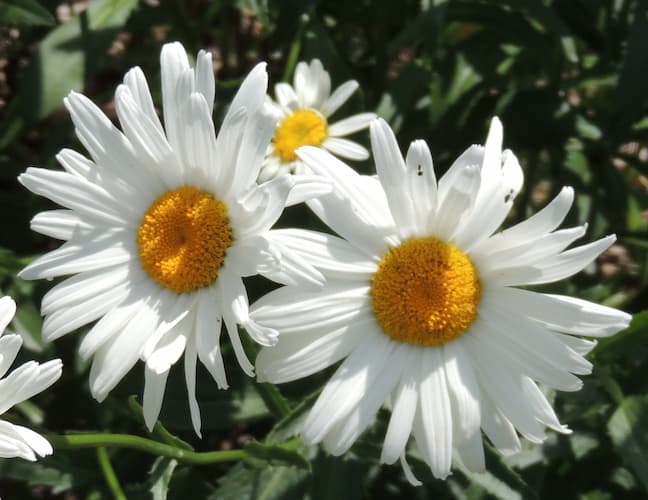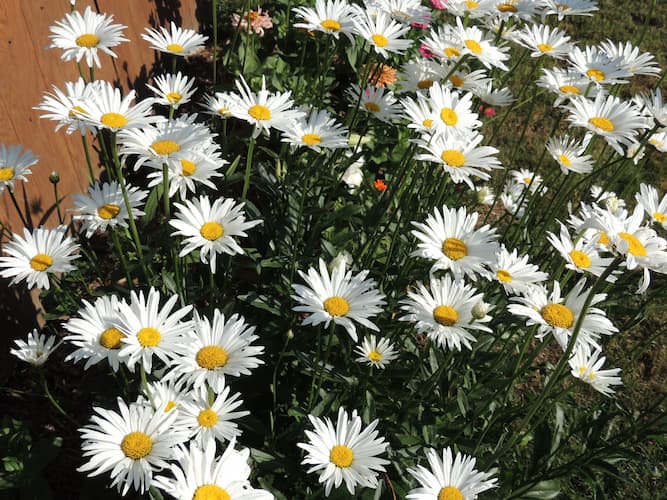How to Grow Shasta Daisy Flowers

About Growing Shasta Daisy Plants in Your Home Flower Garden
Shasta Daisy flowers just might be the most popular of all daisies. It has my vote. This hardy perennial is easy to grow and needs little care. And, they put on an extended show when in bloom. The cheerful, pure white petals, and bright yellow centers, are perfect in almost any garden setting. This guide on “How to Grow Perennial Shasta Daisy Plants” will help you grow these beautiful and cheery flowers year after year with little effort.
Place this daisy in the flower garden, in a mixed border, or grow them in a container on your patio or deck. While Shasta Daisies look great when grown en masse, they are a good-looking stand-alone plant, too.
Shasta Daisies make great cut flowers, brightening up any room they are placed in. They are also popular in floral bouquets.
Shasta Daisy Flowers Plant Specifications
Flower Colors: Brilliant white petals with yellow to yellow-orange centers.
Flowers Bloom: Summer to Fall.
Plant height: Two to three feet tall.
Plant Hardiness Zones: 4 – 9
Ideal Soil pH: 5.5 – 6.2.
Light Needs: Full sunlight to partial sun.
Toxic Plant?: Yes.
Deer Resistant? Yes. The mildly toxic sap is a deterrent to deer, rabbits, and other foraging animals.
Number of Species: 33. it is a member of the over 20,000 species Asteraceae family.
Native to: Northern Europe.
Plant Type: Perennial
Botanical Name: Leucanthemum × superbum (Asteraceae)
Are Shasta Daisies Edible?
NO!!
All parts of the plant are mildly toxic to humans and pets. It causes intestinal irritation and skin irritation.
Keep children and pets away from this plant.
Medicinal Uses for Shasta Daisy Flowers
Despite being mildly toxic, the plant has a variety of medicinal applications and is used in home remedies. The petals of the plant contain antibacterial, anti-inflammatory, and antioxidant compounds. Here are some of the medicinal uses:
- Use it to treat whooping cough.
- It eases bronchitis and coughs.
- A lotion made from the plant treats wounds, and bruises.
- Use it to treat asthma and other respiratory ailments.
Important Note: Because of the mildly toxic nature of Shasta Daisy flowers, we do not recommend using it in home remedies unless you are properly trained in the safe medicinal preparation of this plant.
Light Requirements
Perennial Shasta Daisy plants thrive in full, direct sunlight. The flowers are most prolific and look their best, when grown in full sun. Plant them in a location where they will receive bright sunlight for eight to ten hours or more each day.
In hotter regions, they benefit from partial afternoon sunlight or light shade to protect them from the hot afternoon sun.
Perennial Shasta Daisy Plant Propagation
Shasta Daises are easily started from seeds. Directly sow seeds outdoors after danger of frost has past, and the soil begins to warm. They can also be started indoors, if you prefer.
Plant Shasta Daisies in year one, and they will bloom the second and each following year.
You can also divide and separate established plants. Separate them every three or four years, and they will reward you with bigger blooms. If you do not do this, the plants will begin to crowd each other out, competing for nutrients. As a result, both the plants and the blooms will be smaller.
Days to Germination: seeds sprout in 10 – 21 days.
Plant Spacing: One to two feet apart. The plants tolerate a little crowding.

How to Grow Shasta Daisies Flower Plants
Plant location and soil needs:
Shasta daisy flowers are a low maintenance, easy-to-grow perennial. Select a planting location where they can grow undisturbed for many years. They prefer to grow in full sunlight. But, they tolerate partial afternoon sun.
Daisies like rich, well-drained soil. They are a hardy and forgiving plant, tolerating poorer soils and partial shade. They need little attention during the year.
Dig the hole twice the size of the rootball. Next, mix plenty of compost into the planting site, the first time you plant them. Plant them with the top of the rootball at ground level, or ever so slightly below. Then, fill rich garden soil around the roots. Tamp the soil down slightly. Finally, water them deeply.
Fertilizer needs:
For optimum results, apply a general-purpose fertilizer in the spring, after the plants have begun to grow. Then, apply again every month or two throughout the season. However, in rich soil they need less fertilizer. Just before blooming, provide a fertilizer high in phosphorous to help promote big, bright blooms.
Water Needs:
Keep soil moist, especially during hot, dry periods. The plants need plenty of water to fuel healthy and vigorous growth.
Mulch around plants to keep weeds down, and for a neat and tidy appearance. Mulch also serves to fertilize these hungry plants as it breaks down.
Staking plants is sometimes required, especially when grown in partial shade.
The plants quickly spread to fill in empty spaces. Plan on digging the roots up and separating them every three to four years. First, dig up the roots. They will come up in a big clump. Next, separate the roots into three or four smaller clumps. Then, replant them around your flower garden. Also, don’t forget to give some of the clumps to your gardening buddies.
How to Grow Shasta Daisy Flowers in Containers and Flowerpots
People who have a balcony, deck, or patio just love to grow these bright and cheery plants. In addition to looking great, they thrive in containers with little effort.
Like any container-grown plant, they need just a little more care and attention. In addition to normal plant care, here’s how to grow perennial Shasta Daisy flowers in containers:
- Select a sunny to mostly sunny location on your deck.
- It is important to have a drain hole in the container to allow excess water to drain from the pot.
- Keep an eye on the moisture level. Check the plants every few days, especially in extended periods of hot, dry weather.
- Let the top of the soil dry out between watering.
- When watering the plants, thoroughly and deeply wet the soil. Excess water will drain through the hole in the bottom of the flowerpot.
- Nutrients in a flowerpot are limited. So, use fertilizer spikes to feed the plants. Or, apply a light solution of liquid fertilizer once a month.
Pruning Shasta Daisy Plants
One of the benefits of this low-maintenance plant is that it requires almost no pruning. Simply remove any dead, sick, or diseased leaves and stems.
Also, deadheading spent blooms will prolong the production of more flowers.
More on Deadheading Spent Flower Blooms.
Insects and Plant Disease
Perennial Shasta Daisies seldom are bothered by insects and disease. Generally, these plants do not need insecticides or fungicides.
If insect or disease problems occur, treat them early with an insecticidal soap and /or fungicide.
Also see: Plant Problems – Identify the causes and find the cures.
Overwintering Perennial Shasta Daisy Plants
This hardy perennial plant overwinters well in most areas of the country with no extra care. In warmer regions, the leaves may remain green. However, the plant may go largely to completely dormant. In the coldest areas of the country, after the first hard frost, cut the plant back to a couple of inches above soil level. Protect the roots by covering them with a layer of mulch or dead leaves. Then, rake it off in the early spring.
Related Articles
Also, people who read this article on Shasta Daisy Flowers will like:
How to grow Daisies at Garden Hobbies
Please support our site. Shop for:
- rmmatthews100@hotmail.com
- 585-721-6528
- Rochester, NY
©1999-2024 GardenersNet.Com, All Rights Reserved

